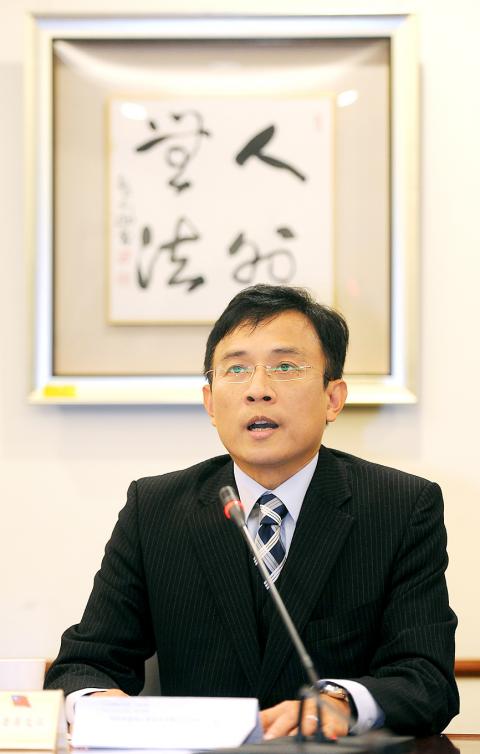|
Peng excluded from prosecutor
evaluation panel
By Lin Ching-chuan, Yang Kuo-wen and Jason Pan / Staff reporters,
with staff writer

Prosecutor Evaluation Committee
member Peng Wen-cheng announces the committee’s findings regarding
Prosecutor-General Huang Shih-ming at a press conference in Taipei on Saturday.
Photo: Liu Hsin-de, Taipei Times
Minister of Justice Lo Ying-shay (羅瑩雪)
yesterday confirmed media reports that Prosecutor Evaluation Committee member
Peng Wen-cheng (彭文正) is not included in the list of committee members who are to
start their second terms next month.
The reports have sparked speculation that the exclusion was a move by the
ministry to settle a score with Peng for his role in leading the 11-member
committee to recommend that Prosecutor-General Huang Shih-ming (黃世銘) be
dismissed after a two-month investigation.
Huang is alleged to have leaked investigative findings to President Ma Ying-jeou
(馬英九) that were gleaned from wiretapped conversations and accused Legislative
Speaker Wang Jin-pyng (王金平) of lobbying the judiciary against appealing a breach
of trust case against Democratic Progressive Party caucus whip Ker Chien-ming
(柯建銘).
Asked about Peng’s exclusion, Lo said: “The nominating panel did not recommend
his name this time. The justice ministry was not involved in the process. We can
only choose the names from the submitted list.”
She denied that it had anything to do with political retribution.
However, many officials and legislators viewed the move as political meddling by
the government and the ministry to remove opposition in the committee.
Ministry officials echoed Lo’s statement yesterday, saying that the list for
second-term committee members had been reviewed and approved by the minister on
Dec. 2, and that the extension of the members’ tenure has nothing to do with the
result of the investigation nor the recommendations made by the committee
against Huang on Saturday.
In response, Peng told reporters: “Judicial reform still has a long way to go in
Taiwan. My tenure was not renewed for a second term and political retribution
most likely played a role. Now I can go back to school and continue teaching.”
Convened in January last year, the Prosecutor Evaluation Committee has a
two-year tenure, with members eligible to continue for a second term.
The panel is staffed by seven members selected from judges, prosecutors and law
practitioners, along with four members representing public interests composed of
experts and academics, such as Peng, a professor from National Taiwan
University’s Graduate Institute of Journalism. Peng acted as committee
spokesperson in the investigation into Huang.
|
![]()
![]()
![]()